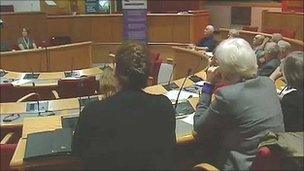More cuts in councillors proposed in five Welsh areas
- Published

Council chambers across Wales could see a reduction in the number of elected members
More plans to reduce the number of councillors in Wales have been put forward to create what supporters say would be greater fairness for voters.
Boundary commissioners' final proposals for Anglesey, Denbighshire, Neath Port Talbot, Newport and draft plans for Bridgend would cut the total by 21.
The aim is that councillors represent roughly the same number of electors.
The final decision on arrangements across the 22 Welsh counties will be taken by the assembly government.
If the proposals, external go through as suggested, the number of councillors would fall from 40 to 36 in Anglesey, and from 47 to 42 in Denbighshire.
In Neath Port Talbot the total would be reduced from 64 to 59, and in Newport from 50 to 46.
Meanwhile, Bridgend would see a reduction from 54 to 51.
The Local Government Boundary Commission for Wales was asked to examine councils' arrangements in January 2009 by the then Local Government Minister Brian Gibbons.
Dr Gibbons said at the time: "Since the last reviews were conducted new communities have been created in some areas and there have been shifts in population in others.
"This means that in some areas there is now an imbalance in the number of electors that councillors represent.
"As far as possible, I want to restore fairness so that councillors generally represent the same number of people."
Dr Gibbons's successor, Carl Sargeant, will have six weeks to consult on the proposals.
Paul Wood, the chair of the commission, said in his introduction to the proposals that the issue of fairness was a "key principle for our work".
He said the commission had aimed for "democratic fairness for all electors" and that, along with other proposals "will lead to local government which is effective and convenient".
Edward Lewis, secretary to the commission, said: "You had one councillor in one area elected by about 650 electors and in another area one elected by just over 6,000 electors. That obviously can't be fair.
"Fortunately those extremes are not in the same council area. What we are trying to do is have a better balance between the electors and the number of councillors.
"The commission are very keen to have greater equality for the electors and councillors for each area because it is important in terms of democracy.
"It would be quite unfair if one group of electors were small in number and elected a councillor, whereas in another part of the same area you could have two or three times the number of electors electing a councillor."
A Welsh Assembly Government spokesman said: "We are in a six-week consultation period during which representations can be made to the Minister for Social Justice and Local Government, Carl Sargeant.
"After this time the minister will consider the report and consultation responses before announcing his decision. It would not be appropriate for us to comment on the commission's recommendations at the moment."
- Published16 June 2010